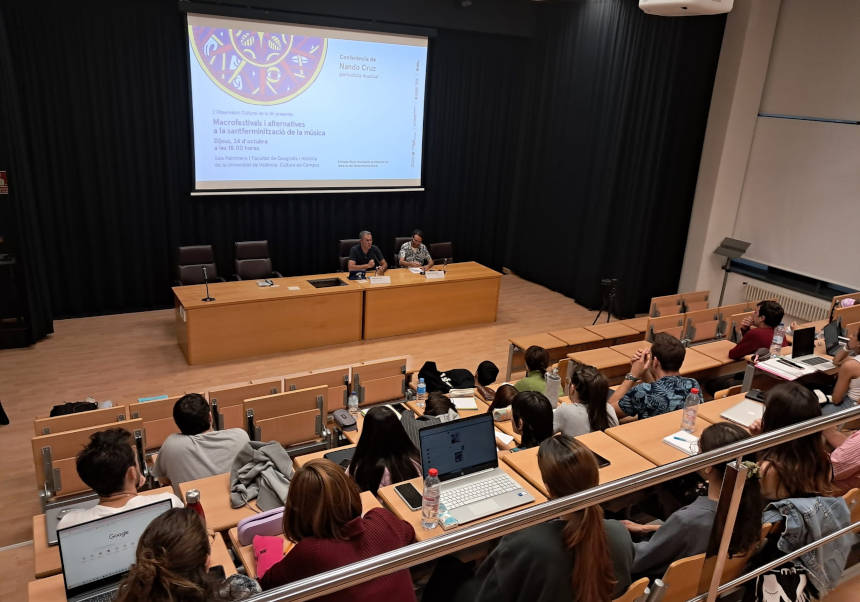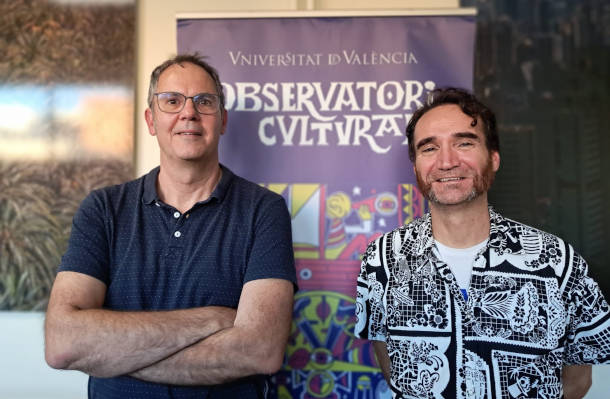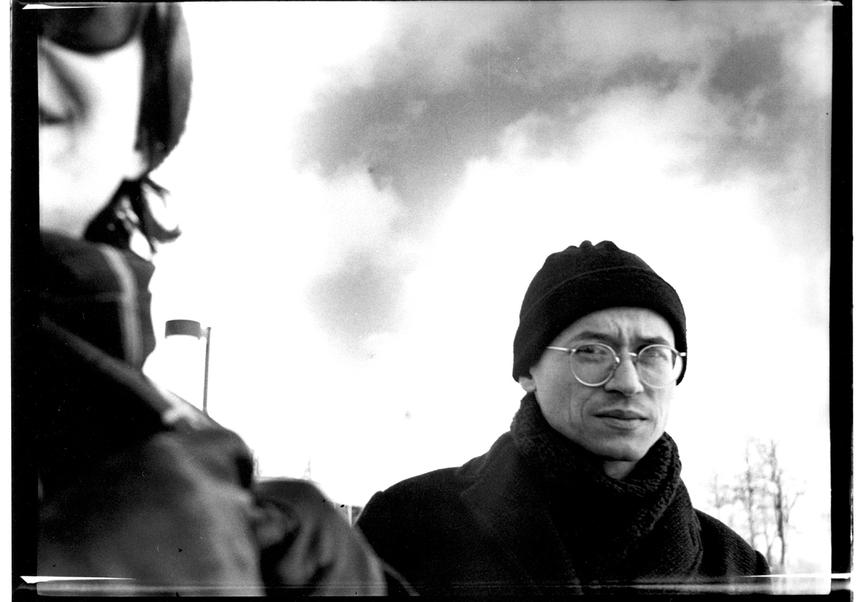Large fests at debate: music gatherings or culture’s black holes?
- UV General Foundation
- M. Angelica Morales Lopez
- October 25th, 2024

Universitat de València’s Cultural Observatory presented on October 24 the “Large fests and alternatives for the ‘sanferminization’ of music” conference, in charge of music journalist Nando Cruz and brought by the Office of the Vice-Principal for Culture and Society. The event was guided by the manager of the UV Observatory, Raúl Abeledo, and took place in the Palminero Room of the Faculty of Geography and History.
“I’m trying to explain what this unbalanced growth in fests for the last two decades imply in Spain. Let alone the amount of them, their size and how their organization has been engulfed by foreign investors in just five years” stated Nando Cruz, the author of “Large fests. Music’s black hole”, a music journalist that visited Universitat de València to reflect and discuss what he’s called “sanferminization of music”
It is true that music fests, big and small, are a part of a culture, but Cruz adds that “they commonly have economic motivations and are used as touristic attractions” whereas other less fancy projects do not receive such attention.
The shadows
He puts the spotlight on this trait since “all the benefits from fests have already been said by the media: were these events to disappear, we wouldn’t be able to enjoy certain artists’ live music” -while “shadows” (those who don’t gain visibility) are everything that this model implies.
According to him, there is a “black hole” in the music industry that’s born within large investments from private foreign funds, and sometimes public ones, looking for economic and touristic revenue. This is Cruz’s biggest concern: “For this to happen, public entities must deny support to smaller local productions from the start...”, which comes with a second “shadow”: “culture becoming a desert”, the phenomena caused by large fests management: contract’s articles that medium and small bands are abusive and vastly restrictive since “they forbid them to perform in other spaces, even when it is them who bring life to the culture aside from three days in summer” and “they make it impossible for rooms too have fair programmes”.
It gets even worse when discussing work conditions for both artists and backstage staff. Nando Cruz refers to the “work precariousness” caused by the model’s “pryramid scheme”. A scheme that even holds onto spaces that “announce themselves” as anticultural. “The distance between the earnings of the first artists to perform and those who perform at six in the afternoon is unbelivable. The first ones can make up to a million and a half euros. The latter ones make six euros per hour”, states firmly. And the same goes to the backstage staff “who can be seen sleeping on rotten and ragged couches if we check social media”.
Therefore, it isn’t a matter of “genre” but of “continent”. They may play reggaeton, trash metal, indie, folk... content is not the issue since the fest is indeed a gathering for music. What we should worry about is the place and its conditions for such large parties to take place.
There is also the “abuse to the public”. High prices for the entrance and basic goods sold inside that people are forced to buy, since they can’t bring their own water or food. A recent example is Woodstock 99, that ended up full of riots and police force, not like its original edition in 1969 that celebrated peace and music to face war and the capitalism behind it.
The lights
So, how is it going? Nando Cruz does see some light at the end and encouraged healthier organization models, more sustainable and respectful with the economy, the environment and people. These issues will be part of the content on the journalist’s coming book, in which he mentions other events as “L’Aplec dels Ports” in Castellón, a party for teenagers previous to the most famous “FIB” born in the 70s that tried to bring back traditional dances criminalized during the francoism and that’s currently managed in a rotation of ten different municipalities to ease the synergy and participation of local youth and face the area’s depopulation.
An added value to projects as “L’Aplec dels Ports” lies in its ability of rescue and spotlighting the ethnic heritage. It promotes the culture and encourages the passing of generations and even the countryside’s economic motion. It is a value large fests cannot claim due to have obvious agendas.

Bio
Nando Cruz (Barcelona, 1968) is a music journalist since the late 80s. He has collaborated with music magazines, general press, TV shows and radio. These last years has enjoyed his work in bringin visibility to music reality severed from the official culture ever since the article series “Otros Escenarios Posibles” that were published in El Periódico de Catalunya, or the radio show “10.000 Fogueres” broadcasted in Betevé. He despises the phrase “Writing about music is the same as dancing about architecture”. He is also author of “Large Fests. Music’s black hole”, from the book series “Little circus. Mouth-to-mouth history of Spain’s indie” and “A week inside a bus’ engine. Tale of the record that almost killed Los Planetas”. The latter inspired Isaki Lacuesta for his fils “Second prize”.
More information:















